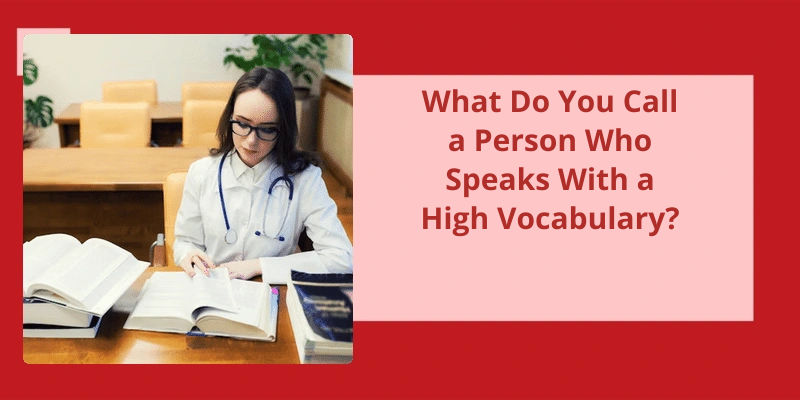When we encounter someone who not only speaks brilliantly but also uses a vast array of complex words that leave us in awe, we may find ourselves searching for the perfect word to describe them. One such word is "loquacious," which refers to a person who tends to speak excessively or uses language that’s flowery and abundant in vocabulary. A loquacious individual is often perceived as knowledgeable, articulate, and well-read, as their extensive vocabulary reflects a deep understanding of language and it’s nuances. However, it’s important to note that there’s a fine line between being loquacious and being verbose, as excessive verbosity may harm communication and misinterpret the intended message. Regardless, the term "loquacious" remains an excellent way of describing someone who loves words and has a talent for using them to convey their thoughts and ideas with eloquence and finesse.
What Is It Called When Someone Has a Strong Vocabulary?
A strong vocabulary is a crucial asset for anyone seeking to become an effective communicator. The ability to articulate your thoughts and ideas in a clear and concise manner is an essential skill for success in many areas of life. Those who possess a strong vocabulary are often viewed as intelligent and well-educated individuals. Not only does a strong vocabulary make communication more effective, but it can also improve critical thinking skills and enhance creativity.
The term used to describe an individual with a strong vocabulary is “vocabularian.”. Vocabularians are often avid readers and writers who value the power of language. They’re committed to improving their verbal and written communication skills and strive to use language in the most precise and effective way possible.
To keep up with the ever-evolving English language, many vocabularians consult the Oxford English Dictionary for new words. Published in September 2018, the latest edition of the OED includes more than 1,100 new words and phrases. These additions reflect the changing landscape of modern society and include words and phrases related to technology, social media, and current events. Some of the new entries in the OED include “hangry” (feeling irritable due to hunger), “mansplain” (to explain something to a woman in a condescending or patronizing manner), and “unmanned aerial vehicle” (a drone).
The OED is widely considered to be the definitive authority on the English language. Originating in the United Kingdom, the OED has been in continuous publication since 188It’s updated quarterly to reflect new developments in the language and is an essential resource for anyone interested in language and linguistics. In addition to it’s role as a comprehensive dictionary, the OED also serves as an important historical record, tracing the evolution of English vocabulary over time.
The Oxford English Dictionary is an essential resource for anyone interested in language and linguistics, providing a comprehensive overview of the English language and it’s development over time. With the addition of more than 1,100 new words and phrases in the latest edition, the OED remains an indispensable tool for vocabularians and language enthusiasts alike.
Tips for Improving Your Vocabulary
- Read books, articles, and other materials regularly.
- Keep a notebook handy to jot down new words you come across.
- Use a dictionary and thesaurus to expand your knowledge of words.
- Play word games and puzzles to help memorize new vocabulary.
- Listen to podcasts and audiobooks to expose yourself to new words and phrases.
- Engage in conversations with people who’ve a vast vocabulary.
- Learn the roots and origins of words to better understand their meaning.
- Study and memorize common prefixes, suffixes, and affixes to help decipher new words.
- Join a book club or writing group to discuss and explore new words together.
However, while a large vocabulary can be an indicator of intelligence, it’s important to note that intelligence goes beyond just one aspect. In this article, we will delve deeper into the connection between vocabulary and IQ, and explore other factors that contribute to overall cognitive ability.
Does a Good Vocabulary Mean High IQ?
For starters, having an extensive vocabulary means having more tools to express oneself. People who’ve access to a broader range of words are more likely to be able to effectively convey their thoughts, feelings, and ideas. This is especially important in fields like law, journalism, and academia, where precision and clarity are paramount.
Additionally, a large vocabulary can indicate a persons ability to learn and retain information. Words are often learned through context, and someone who can understand and remember nuanced definitions is likely to have a strong memory and learning capacity. Likewise, people who’re able to quickly understand and apply new words in context may have an aptitude for learning languages or other complex subjects.
But vocabulary alone isnt enough to accurately assess someones intelligence. Verbal IQ and vocabulary may be correlated, but they aren’t the same thing. IQ is a measure of a persons overall cognitive abilities, encompassing skills like critical thinking, problem-solving, and pattern recognition. Vocabulary only addresses one facet of intelligence, albeit an important one.
It’s also worth noting that language and culture play a significant role in ones vocabulary. A person who grows up in a household where multiple languages are spoken will have a larger vocabulary than someone who isnt exposed to other languages. Similarly, people who’re well-read or have traveled extensively may have more words at their disposal simply because theyve been exposed to more diverse cultures and perspectives.
Many factors contribute to a persons vocabulary, including environment, learning capacity, and cultural exposure. It’s important to remember that intelligence is a multidimensional concept, and no single metric can fully capture it’s nuances.
The Psychological Benefits of Learning New Words and Expressing Oneself.
- Improved communication skills
- Increased self-confidence
- Enhanced cognitive abilities
- Expanded vocabulary
- Better memory retention
- Stress relief through writing or speaking
- Greater empathy and understanding of others
- Increased creativity
- Opportunities for personal growth
An expansive vocabulary offers individuals the power to express themselves with precision, aiding in both personal and professional communication. Additionally, a diverse lexicon can also be a sign of intelligence and education, making it a highly desired trait in many social circles. However, there are downsides to being a wordy individual, including confusing or alienating those who may not share the same vernacular. In this article, we’ll explore the pros and cons of having a large vocabulary, and offer tips for expanding your own.
What Does It Mean When Someone Has a Large Vocabulary?
You’ve a large vocabulary, you’re better equipped to express yourself clearly and effectively in both written and verbal communication. This is essential for success in many areas of life, from academic and professional pursuits to personal relationships.
One benefit of having a large vocabulary is the ability to convey complex ideas and emotions with precision and clarity. When you’ve a wide range of words at your disposal, you can choose the right ones for the situation and avoid ambiguity or misunderstandings. You’re also able to articulate your thoughts more succinctly, which can make your arguments more persuasive and your ideas more compelling.
When you read a book or watch a movie, you’re exposed to new ideas and perspectives. If you’ve a rich vocabulary, you’re better able to understand and appreciate the subtleties of language and imagery, which can deepen your enjoyment and understanding of the work.
How to Improve Your Vocabulary: Strategies and Tips for Expanding Your Word Knowledge.
- Read extensively
- Use a dictionary regularly
- Learn a new word every day
- Practice with word games and puzzles
- Watch movies and TV shows with subtitles
- Join a book club
- Try online vocabulary building resources
- Use flashcards to memorize words
- Engage in conversations with diverse groups of people
- Write regularly, and review and learn from your mistakes
Having the ability to articulate thoughts and express oneself in a way that’s captivating and effective is a valuable skill in both personal and professional settings. Whether it’s delivering a speech, writing an email, or simply engaging in conversation, being well-spoken can leave a lasting impression. In this article, we’ll delve deeper into the concept of being well-spoken and explore the many synonyms and related words that describe this highly desirable trait.
What Is the Word for Someone Who Uses Words Well?
The art of speech is something that’s captured the imagination of people throughout the ages. From the great speeches delivered by historical figures to the poetry of modern-day spoken word artists, there’s always been a fascination with the ability to communicate effectively and beautifully with words. But what do we call someone who uses words well? There are many synonyms for this term, but perhaps the most common one is “well-spoken.”
To be well-spoken means to speak in a way that’s clear, articulate, and persuasive. It means choosing the right words and using them effectively to convey meaning and emotion. A well-spoken person isn’t only able to express themselves clearly, but they’re also able to captivate their audience and hold their attention. They’re able to convey complex ideas and understandings in a way that’s both elegant and concise.
In many ways, being well-spoken is a gift. It’s a talent that must be developed and cultivated over time, through practice and dedication. But it’s also a trait that anyone can aspire to. Whether you’re a business executive, a teacher, a writer, or just someone who wants to communicate more effectively with others, there’s always room for improvement. By studying the art of speech and working to sharpen your skills, you can become a well-spoken person and reap the benefits that come with it.
The word for someone who uses words well encompasses a wide range of synonyms such as eloquent, expressive, fluent, clear, and comprehensible. By developing your skills at communication and engaging in meaningful conversations, you can become a well-spoken person and reap the rewards that come with it.
Being able to express yourself effectively through written language is a crucial skill that serves you well in various personal and professional contexts. A strong vocabulary is an essential component of effective writing, and it can help you communicate your thoughts with precision and clarity. So, in this article, we’ll explore what it means to have a robust vocabulary and why it’s essential to cultivate it.
What Does It Mean to Have a Strong Vocabulary?
Having a strong vocabulary means that you’ve a wide range of words and phrases at your disposal that accurately communicate your thoughts and ideas. A large vocabulary allows you to express yourself clearly and concisely, without resorting to vague or imprecise language. It also helps you to choose the right word for the situation, which can be especially important in the professional world.
In addition to facilitating precise writing, a strong vocabulary can help you to understand and engage with complex texts. When you encounter unfamiliar words, you’re better equipped to use context clues to decipher their meaning. This makes it easier to comprehend difficult texts and learn new concepts. Moreover, having a wide range of vocabulary is particularly helpful when it comes to standardized tests, such as the SAT and GRE, which often include questions that test your knowledge of obscure words.
Tips for Building a Strong Vocabulary: This Could Include Suggestions on How to Actively Expand Your Vocabulary, Such as Reading Widely, Keeping a Word Journal, or Playing Word Games.
Here are some practical tips to improve your vocabulary: read material from a diverse range of sources, make a record of unfamiliar words in a notebook or app, and engage in games or activities that require word knowledge such as crossword puzzles or word scrambles.
Conclusion
In conclusion, language is a powerful tool that human beings use to communicate with one another. From the way we speak to the words we choose to use, language is an incredibly complex part of our daily lives. When someone speaks with a high vocabulary, they’re often described as loquacious. This term reflects their ability to express themselves in a detailed and articulate manner. However, it’s important to remember that language isn’t just about vocabulary and eloquence. It’s also about listening, understanding, and connecting with others. Whether we’re speaking to someone who’s loquacious or not, we must strive to communicate effectively and compassionately, in order to build strong relationships and foster meaningful connections.






